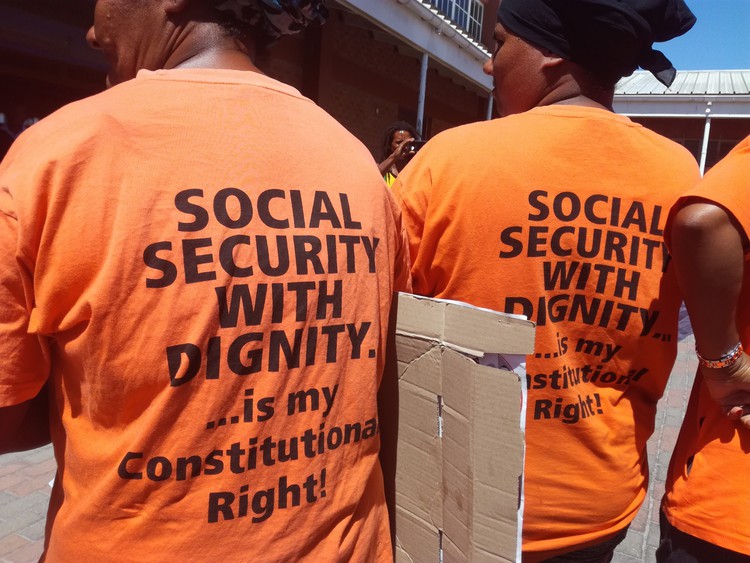SASSA is making progress against fraud, our study shows
But there are likely many fraudulent grant applications made years ago that still receive money
The SRD grant application system has been systematically defrauded. Archive photo: Barbara October
- SASSA has committed to eliminating fraudulent SRD grant applications.
- We checked SASSA’s commitment by analysing a sample of 2,405 fraudulent applications.
- We found that SASSA has made good progress but there are likely still a large number of fraudulent applications made years ago that receive money.
On Tuesday, GroundUp reported that the South African Social Security Agency (SASSA) will suspend payments of the Covid-19 Social Relief of Distress (SRD) grant to fraudulent beneficiaries.
We decided to investigate how seriously SASSA is addressing the issue. We obtained a sample of 2,400 applications that we know to be fraudulent. They were sent to us by the N4aughtySec Group, a hacker group that emerged after taking public responsibility for an attack on TransUnion and Experian in March 2022. The group claimed to have demanded a ransom of $30-million from each company. In November reports emerged that N4aughtySec had stolen R175-million through SASSA SRD Grants they opened through TymeBank.
In November 2024 N4aughtySec provided GroundUp with its evidence. We could not validate the claim that R175-million was stolen, but were able to isolate a list of 2,405 known fraudulent SASSA SRD Grants and their associated fraudulent phone numbers.
SASSA categorises applications into one of four categories:
- Invalid: The SASSA grant does not exist or the phone number registered to the SASSA grant does not match.
- Awaiting Identity Verification: The SASSA SRD Application has been blocked until the person verifies their identity by facial scan.
- Active Application: These are applications currently active and not marked as fraudulent.
- Awaiting Reapplication: These require people to reapply for the SRD grant.
The results of our analysis are summarised in this table:

Initially, we examined the data in November 2024 to establish a baseline understanding of how fraudulent applications were being managed. We noticed a significant number of these applications remained active or were in the “Awaiting Identity Verification” category, raising questions about SASSA’s ability to handle such cases efficiently.
Note that this is a sample. There are many more fraudulent grants. But assuming this sample is representative – and there is no reason to think it isn’t – it can tell us how much progress SASSA has made.
When we revisited the data on 21 January 2025, we were able to compare the changes that had occurred over the past two months. This comparative analysis allowed us to measure the extent of SASSA’s efforts and determine whether there had been tangible progress identifying and suspending fraudulent grants.
The shifts in the numbers demonstrate that SASSA has made considerable progress, although some fraudulent applications persist.
The number of applications flagged as “Awaiting Identity Verification” more than doubled, indicating that SASSA is actively blocking grants until identity verification is completed.
Active applications dropped by 73%, suggesting an effort to stop known fraudulent grants.
A slight increase in “Invalid” applications (up 4%) further reflects ongoing system adjustments. (The Awaiting Reapplication category has too few entries to reach meaningful conclusions.)
Based on our findings, SASSA has made progress in addressing fraudulent applications. But SASSA needs to continue to improve its processes, detection systems, and ensure that fraudulent cases are resolved swiftly. SASSA also needs to make sure its verification system is up and easy-to-use. At the time of writing it is down.
Support independent journalism
Donate using Payfast

Next: New school for blind learners delayed
Previous: Judge Mbenenge denies sending a picture of his private parts to his secretary
Letters
Dear Editor
One way to stop fraudulent SASSA grants is to require confirmation from the cell phone provider that the SIM card has been FICAed. It is common knowledge that there are literally millions of UNRICAed SIM cards which are used by criminals daily.
Another main enabler of money laundering and illegal transfer of cash out of South Africa is the instant money service offered by all the major supermarket chains.
They require the sender to provide proof of Identity. I have personally witnessed multiple transactions where the sender has merely orally given their (alleged) ID number. No requirement to provide original ID book/card, and the ID is not verified against a government database to ensure that it is not a fraudulent ID.
All that the sender has to provide for the receiver is a cell number – and there is no procedure to verify if the SIM card has been FICAed so there is no way to identify the recipient. Up to R3,000.00 a day or R250,000.00 a month can be sent from an unverified sender to an unverified cell number.
© 2025 GroundUp. This article is licensed under a Creative Commons Attribution-NoDerivatives 4.0 International License.
You may republish this article, so long as you credit the authors and GroundUp, and do not change the text. Please include a link back to the original article.
We put an invisible pixel in the article so that we can count traffic to republishers. All analytics tools are solely on our servers. We do not give our logs to any third party. Logs are deleted after two weeks. We do not use any IP address identifying information except to count regional traffic. We are solely interested in counting hits, not tracking users. If you republish, please do not delete the invisible pixel.

